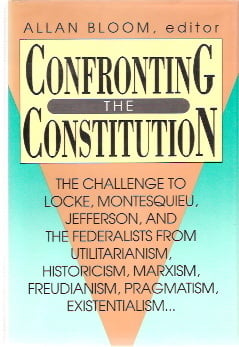In their program “A Decade of Study of the Constitution,” Robert A. Goldwin and his collaborators at the American Enterprise Institute have consistently published the most readable and stimulating discussions of contemporary constitutional issues to have appeared in America. The virtues of previous AEI books such as How Democratic is the Constitution? are embodied, on a larger scale, in a new collection of essays edited by Allan Bloom, Confronting the Constitution, which takes the form of a theological disputation where the orthodoxy being defended is “the thought of the Constitution,” or, more precisely, the philosophical beliefs and social structures supposedly implicit in the early American version of liberal democracy.
Heresies against the Constitution include Utilitarianism, Marxism, Idealism, Historicism, and other Isms which. Bloom asserts in a brilliant if not entirely persuasive essay, are offshoots of Rousseau-ism: “In essence, Rousseau’s bourgeois is identical to Locke’s rational and industrious man . . . [who] might be an instrument of stability, but the cost of relying on him is human dignity. This contrast between two ways of seeing the central actor in modernity summarizes the continuous political debate of the past two centuries.” Bloom notes that, with one exception, “All of the contributors to this book are . . . students of, or students of students of, Leo Strauss,” a German emigre scholar who “reinterested us in America by teaching us how to read our country’s political texts and demonstrating how wise they are.” Very Straussian is Bloom’s distinction between classic Lockean liberal democracy and modern ideologies (for Strauss, Machiavelli rather than Rousseau was the evil thinker who separated the “ancients” from the “moderns”). Also characteristically Straussian is the tendency to treat politicians and historical events as epiphenomena of political theory. As Bloom says, “Bacon, Locke, and Montesquieu are worthy interlocutors—on the level of Kant, Hegel, Marx and Nietzsche, who inspired less impressive political achievements.” If you mentally added, “such as those of Hitler, Stalin and Pol Pot” to the last line, you win an A in the Straussian school of esoteric reading.
As a rule the essays in Confronting the Constitution are thorough and scholarly. Thomas L. Pangle and David F. Epstein have contributed good discussions of “The Philosophic Understanding of Human Nature Informing the Constitution” and “The Political Theory of the Constitution,” respectively. The sections on post-Lockean philosophies are less impressive. Harvey C. Mansfield, Jr., the champion of extra-constitutional executive prerogative, engages in a rambling and incoherent attack on a straw man he calls Social Science. One wonders why chapters on the existentialists, Freud, and the trio of Rawls, Dworkin, and Nozick were included at all, particularly since this meant less space went to the important alternatives to Lockean liberalism—Utilitarianism, Idealism, and Historicism.
Susan Shell’s too-brief and muddied account of the German idealist tradition of Kant, Fichte, and Hegel fails to meet the standard set by Bloom in his own essay on Rousseau. A certain lack of moral discrimination and historical distance is evident in her praise of “what Abraham Lincoln once called our ‘political religion,’ the core beliefs that constitute us as a country and as a nation,” and in her criticism of the “fanatical nationalism” of the Mexican War. (Who was more “fanatical”—President Polk, who secured Texas against recurrent Mexican invasions and gained the Southwest in a limited war ending in a negotiated settlement, or President Lincoln, who invoked a mystical “Union” and drenched the continent in blood while refusing to negotiate with the South?) The absence of a thorough and serious discussion of Idealism is a pity, because it is the idealist conception of communitarian national democracy, not Lockean liberal democracy, which inspired the “Springtime of Nations” in Europe in 1989.
The Idealist tradition, it might be added, could provide American conservatism with a firmer intellectual basis than the inanities of natural-rights and social-contract doctrine, or the sonorities of Burkeanism. Such a suggestion, of course, would horrify Straussians, whose definition of America as a purely voluntary society united by rational assent to a few 18th-century Whig dogmas better describes a club rather than any flesh-and-blood country, including America, yesterday and today. Bloom, with others of his school, finds it difficult to distinguish healthy subphilosophical patriotism from throne-and-altar reaction and xenophobic fascism: “The genius of this country—which cannot and does not wish to treat its citizens like plants rooted in its soil—has consisted in a citizenship that permits reflection on one’s own interest and a calm recognition that it is satisfied by this regime.” Is it “reflection on one’s own interest” rather than “the instinctive and unquestioning love of our own” that motivates our troops in Saudi Arabia? Bloom writes of such watery commitment, “This is the peculiarly American form of patriotism.” Actually, it is a form of patriotism most Americans find peculiar.
This completely abstract definition of American identity, empty of everything historic, cultural, and contingent which makes the United States more than a test case for a hypothesis of I Sth-century intellectuals, is what separates conservatives from Straussians (and libertarians). Either there is an American nation, above and beyond mere frames of government and “political religions,” or there is not. If there is an American nation, then constitutional questions take second place to questions of cultural and social identity. If there is not an American nation, merely an American government, then a clever constitution and elaborate political ideology will not prevent American society from collapsing into racial, religious, regional, and class Balkanization. Straussians believe that the “thought of the Constitution” is all that ultimately holds the United States together. Conservatives fear that they may be correct.
[Confronting the Constitution, Edited by Allan Bloom (Washington, D.C.: The American Enterprise Institute for Public Policy) 564 pp., $24.95]

Leave a Reply